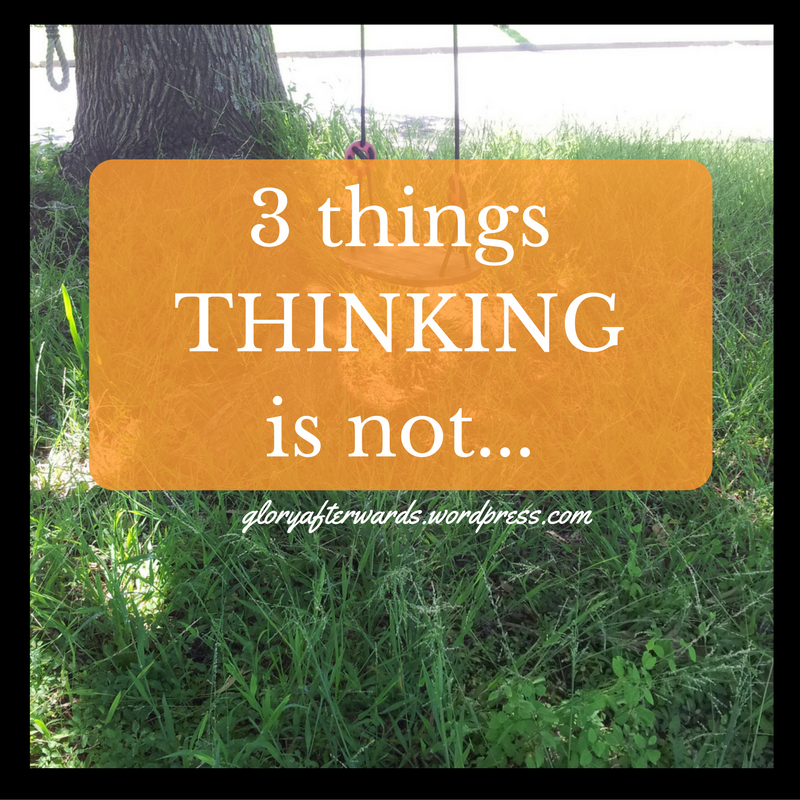I spend a lot of time inside my head. At least that’s what people tell me. Usually after I’ve given them two forks for dinner or locked myself out of my internet banking once again.
Although, come to think of it, they usually use phrases more like “absent minded” or “head in the clouds”.
I was thinking!
That’s always my defence. And it’s true. I was thinking – just not about setting the table or logging into my bank account.
Thinking is good. We can’t do anything without thinking. It helps us make decisions, plan events or even just empathise with people.
One thing I’ve been thinking about lately (if this can be called a pun, it’s entirely intended) is that sometimes thinking can be unhelpful.
Thinking is not an end in itself
Thinking, pondering, musing, considering – whatever you want to call it – it typically not an end in itself. We don’t normally think to think. Perhaps we should. Usually, however, the types of things we ponder mean that thinking is actually only the first step.
When we are considering the pros and cons of a decision, thinking about it isn’t enough. We have to actually make the decision.
The problem with thinking is when we confuse it with what it is not. Let me explain.
-
Thinking is not praying
This is one I struggle with, and it can be a hard distinction to make.
Often we pray in silence. “In our heads” so to speak. Unfortunately (or fortunately) we also think in silence, in our heads.
This makes it easy to mistake thinking about God with praying to God.
What does this look like in a practical sense? Often for me, it means that I spend some time reading the Bible, and then I spend some time thinking about what I’ve read. And then I begin to pray. I might begin something like this: Thankyou Lord that You actually are a holy God.
And then my thoughts slip into thinking about how the chapter shows how holy God is, and wondering if He would still be utterly holy if Jesus did not die for our sins, and that reminds me of that verse in Hebrews…
And after about ten minutes I realise that I have to leave the house for work, and snap my Bible shut with a “thankyou Lord” and get up – believing I’ve just spent fifteen minutes in prayer.
No, I haven’t.
I spent fifteen minutes thinking about God – not talking to Him.
There’s a difference and it’s important.
-
Thinking is not worship
In the same way I often find myself believing that I’m worshipping God… when actually, I’m only thinking about it. This distinction is even more subtle than the last one, because often we relate worship to feelings.
And feelings are very like thoughts.
I might be walking down the street to the post box. The sun is shinning. Not hot and oppressively, but in an interesting, dancing with the clouds sort of way. There’s a spring-smelling breeze. No one is in sight. It’s beautiful day, and then I get a text message. Good news! One of my friends who had been praying about a visa finally received it.
I feel very happy. I feel relaxed. I realise that my prayers have been answered, and God is so good. I spend the whole trip to the post office thinking about how great life is, wrapped in a joyful cloud of thoughts and emotions.
When I return home, I thank God that I was able to go for a walk and spend the time worshiping Him.
And then I stop. Was I actually worshiping Him? Was I actually exclaiming how good He was? Or was I merely thinking happy thoughts?
There’s a difference and it’s important.
-
Thinking is not sharing
We’ve talked a bit about how thinking can often be mistaken with relating to God. This is relatively simple to understand, because God is an invisible God, and so is our thought life.
Yet it can happen in our relationships with people too.
I don’t merely mean that at times we think about telling someone something, and then we think we have – only to discover we only thought about it.
I mean when we have something that ought to be shared. Perhaps a burden in our life, perhaps a joy close to our heart, perhaps something we’ve learned or something we’ve observed.
Instead of sharing it with others, instead of putting it into words, we simply think it them – and imagine we’ve derived the same benefit.
Perhaps for ourselves we have. Perhaps once you’ve thought it over you feel as settled as if you’d shared your trial with a friend. Perhaps more settled. This is true sometimes.
Still, I’m always surprised about how much better I feel after physically talking.
Yet even if this is not the case, even if for myself I only need to think not share, it’s important to remember that the sole reason we share is not to “feel better”.
It’s to love others. To enrich their life. To deepen relationships. To open up deep conversation. To love and care and display the person God made us and to uncover the person God made them.
There’s no doubt that it’s hard to share. It can be difficult to put our thoughts into words. They can seem too private, too weighty, too silly.
Yet thinking will only ever change you.
Sharing will change you and others.
There’s a difference, and it’s important.
How to stop thinking
Don’t stop thinking! Don’t stop pondering deep ideas by yourself. Thinking is the stepping stone for prayer, for worship, for sharing.
Don’t stop thinking – but don’t stop at thinking either.
Moving beyond thinking is something that has to be intentional. It’s difficult. It’s uncomfortable. It may feel odd.
We may simply not be the sort of person who “shares”.
Nevertheless, it’s important. Because moving beyond thinking will enrich and deepen our thoughts like nothing else. It will render them even more valuable and even more comforting and delightful. There’s a whole world of responses and relationships out there.
There’s a difference between thinking and actual prayer, actual worship and physically sharing. And it’s important.











